Boiler tubes are key components in boiler systems, and their selection directly affects the safety, efficiency, and life of the boiler. When selecting a tube, multiple factors must be considered, including operating conditions, material properties, economics, and environmental requirements. The following is a detailed analysis of the factors that need to be considered when selecting a boiler tube:
The working conditions of boiler tubes are the primary consideration for their selection, which mainly include the following aspects:
Operating temperature
Boiler tubes are subject to high temperatures during operation, so the appropriate material must be selected based on the boiler's operating temperature. For example:
Low-temperature boilers (<400°C) can use carbon steel or low-alloy steel.
Medium-temperature boilers (400°C-600°C) typically use low-alloy heat-resistant steels such as 15CrMo and 12Cr1MoV.
High-temperature boilers (>600°C) require high-alloy heat-resistant steel or austenitic stainless steels such as TP347H and Super304H.
Work pressure
Boiler tubes need to withstand the high pressure of steam or water inside, so they must be made of materials with sufficient strength. When selecting a tube, determine the tube wall thickness and material grade based on the design pressure to ensure it can withstand the operating pressure without bursting or deforming.
Dielectric properties
The medium in the boiler tube may be water, steam or flue gas, and different media have different corrosive properties on the material. For example:
Water or steam may cause oxidation, hydrogen embrittlement or alkaline corrosion.
Flue gas may contain corrosive components such as sulfide and chloride, so corrosion-resistant materials need to be selected.
Heat load
The thermal load on boiler tubes directly affects their operating temperature and thermal stress. High heat load areas (such as the furnace) require materials that are resistant to high temperatures and thermal fatigue.
The material properties of boiler tubes are the core of the selection, which mainly include the following aspects:
High-Temperature resistance
Boiler tubes must maintain sufficient strength and oxidation resistance at high temperatures. When selecting materials, consider their creep strength, endurance strength, and oxidation resistance.
Corrosion resistance
Select materials with good corrosion resistance based on the characteristics of the medium. For example, if the flue gas contains sulfides, materials resistant to sulfur corrosion are required.
Mechanical properties
Boiler tubes must possess excellent mechanical properties, including tensile strength, yield strength, elongation, and impact toughness, to ensure they resist fracture or deformation under operating conditions.
Thermal fatigue resistance
Boiler tubes experience temperature fluctuations during startup and shutdown, which can lead to thermal fatigue. Consider the material's thermal fatigue resistance when selecting materials to prevent cracks.
Weldability
Boiler tubes often require welding, so the material's weldability is crucial. When selecting a material, consider its weldability, weld joint strength, and corrosion resistance in the weld area.

On the premise of meeting the performance requirements, the selection of boiler tubes also needs to consider economic efficiency:
Material costs
The costs of different materials vary significantly. For example, carbon steel is relatively cheap, while high-alloy steel and stainless steel are more expensive. When selecting a material, you need to strike a balance between performance and cost.
Processing costs
The processing cost of boiler tubes includes cutting, welding, heat treatment, etc. The processing difficulty and cost should be considered when selecting materials.
Maintenance costs
Although high-quality materials may have a higher initial cost, they can reduce maintenance costs and extend service life. Therefore, it is important to consider the full life cycle cost when selecting a product.
The selection of boiler tubes also needs to consider environmental factors:
Environmental requirements
The production and use of boiler tubes must comply with environmental requirements. For example, certain materials may contain hazardous elements (such as lead and cadmium) and should be avoided.
Energy saving and emission reduction
Choosing high-efficiency, durable boiler tubes can improve boiler thermal efficiency, reducing energy consumption and emissions.
The selection of boiler tubes must comply with relevant standards and specifications, including:
International standards: such as ASME and ISO.
National standards: such as GB/T 5310 (China's standard for seamless steel tubes for boilers).
Industry standards: such as those for the power and chemical industries.
When selecting a boiler, ensure that the materials, dimensions, and performance meet the standard requirements to ensure boiler safety and reliability.
Read more: Acid and Alkali Resistance of Boiler Tubes
1. Working conditions
The working conditions of boiler tubes are the primary consideration for their selection, which mainly include the following aspects:
Operating temperature
Boiler tubes are subject to high temperatures during operation, so the appropriate material must be selected based on the boiler's operating temperature. For example:
Low-temperature boilers (<400°C) can use carbon steel or low-alloy steel.
Medium-temperature boilers (400°C-600°C) typically use low-alloy heat-resistant steels such as 15CrMo and 12Cr1MoV.
High-temperature boilers (>600°C) require high-alloy heat-resistant steel or austenitic stainless steels such as TP347H and Super304H.
Work pressure
Boiler tubes need to withstand the high pressure of steam or water inside, so they must be made of materials with sufficient strength. When selecting a tube, determine the tube wall thickness and material grade based on the design pressure to ensure it can withstand the operating pressure without bursting or deforming.
Dielectric properties
The medium in the boiler tube may be water, steam or flue gas, and different media have different corrosive properties on the material. For example:
Water or steam may cause oxidation, hydrogen embrittlement or alkaline corrosion.
Flue gas may contain corrosive components such as sulfide and chloride, so corrosion-resistant materials need to be selected.
Heat load
The thermal load on boiler tubes directly affects their operating temperature and thermal stress. High heat load areas (such as the furnace) require materials that are resistant to high temperatures and thermal fatigue.
2. Material properties
The material properties of boiler tubes are the core of the selection, which mainly include the following aspects:
High-Temperature resistance
Boiler tubes must maintain sufficient strength and oxidation resistance at high temperatures. When selecting materials, consider their creep strength, endurance strength, and oxidation resistance.
Corrosion resistance
Select materials with good corrosion resistance based on the characteristics of the medium. For example, if the flue gas contains sulfides, materials resistant to sulfur corrosion are required.
Mechanical properties
Boiler tubes must possess excellent mechanical properties, including tensile strength, yield strength, elongation, and impact toughness, to ensure they resist fracture or deformation under operating conditions.
Thermal fatigue resistance
Boiler tubes experience temperature fluctuations during startup and shutdown, which can lead to thermal fatigue. Consider the material's thermal fatigue resistance when selecting materials to prevent cracks.
Weldability
Boiler tubes often require welding, so the material's weldability is crucial. When selecting a material, consider its weldability, weld joint strength, and corrosion resistance in the weld area.

3. Economical
On the premise of meeting the performance requirements, the selection of boiler tubes also needs to consider economic efficiency:
Material costs
The costs of different materials vary significantly. For example, carbon steel is relatively cheap, while high-alloy steel and stainless steel are more expensive. When selecting a material, you need to strike a balance between performance and cost.
Processing costs
The processing cost of boiler tubes includes cutting, welding, heat treatment, etc. The processing difficulty and cost should be considered when selecting materials.
Maintenance costs
Although high-quality materials may have a higher initial cost, they can reduce maintenance costs and extend service life. Therefore, it is important to consider the full life cycle cost when selecting a product.
4. Environmental requirements
The selection of boiler tubes also needs to consider environmental factors:
Environmental requirements
The production and use of boiler tubes must comply with environmental requirements. For example, certain materials may contain hazardous elements (such as lead and cadmium) and should be avoided.
Energy saving and emission reduction
Choosing high-efficiency, durable boiler tubes can improve boiler thermal efficiency, reducing energy consumption and emissions.
5. Standards and specifications
The selection of boiler tubes must comply with relevant standards and specifications, including:
International standards: such as ASME and ISO.
National standards: such as GB/T 5310 (China's standard for seamless steel tubes for boilers).
Industry standards: such as those for the power and chemical industries.
When selecting a boiler, ensure that the materials, dimensions, and performance meet the standard requirements to ensure boiler safety and reliability.
Read more: Acid and Alkali Resistance of Boiler Tubes









